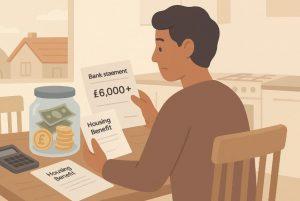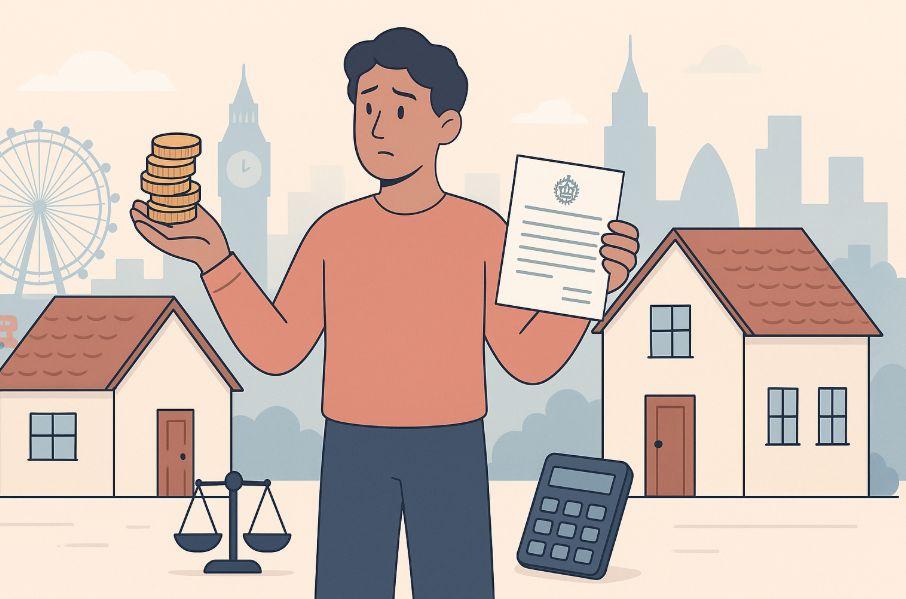Understanding how the housing benefit savings limit works is essential for anyone in London or across the UK relying on support to cover rent. This benefit is means-tested, meaning your income and savings directly influence how much help you can receive. In this guide, we explore the key savings thresholds, how they impact eligibility, and what you need to know to manage your claim effectively.
What Is the Housing Benefit Savings Limit in the UK?
 The Housing Benefit savings limit in the UK plays a significant role in determining whether an individual or household qualifies for financial support towards rent. Housing Benefit is a means-tested benefit, which means entitlement depends largely on income and savings. The threshold for savings is set by the Department for Work and Pensions (DWP), and these rules are consistent across England, including London.
The Housing Benefit savings limit in the UK plays a significant role in determining whether an individual or household qualifies for financial support towards rent. Housing Benefit is a means-tested benefit, which means entitlement depends largely on income and savings. The threshold for savings is set by the Department for Work and Pensions (DWP), and these rules are consistent across England, including London.
As of 2025, individuals of working age can have up to £6,000 in savings without it affecting their Housing Benefit entitlement. Between £6,000 and £16,000, the benefit amount is gradually reduced based on an assumed income from those savings.
Once total capital exceeds £16,000, most people are no longer eligible to claim Housing Benefit unless they receive certain other benefits, such as Pension Credit Guarantee Credit. These rules ensure that financial support is directed at those most in need.
How Do Savings Affect Housing Benefit Entitlement?
Savings can have a direct impact on how much Housing Benefit an individual receives. This is because the benefit system assumes that those with higher savings should be able to contribute more towards their living costs. When a claimant has more than £6,000 in savings, the government calculates something known as “tariff income”.
For working-age claimants, every £250 above the £6,000 threshold is treated as generating an additional £1 of weekly income. This assumed income is added to any actual income the person has and is then used to reassess their Housing Benefit. The more savings a claimant has, the higher their tariff income, and the less Housing Benefit they are entitled to receive.
What Are the Current Capital Rules for Housing Benefit?
Capital includes any money held in bank or building society accounts, stocks and shares, land or property (other than the home you live in), Premium Bonds, and similar assets. The current rules set a lower savings limit of £6,000, below which savings are ignored. Between £6,000 and £16,000, benefits are reduced proportionally, and if capital exceeds £16,000, entitlement usually ceases altogether unless the claimant is receiving Pension Credit Guarantee Credit.
These rules apply differently to people over State Pension age. For pensioners, the lower limit rises to £10,000, and tariff income is calculated at £1 for every £500 above that threshold. However, like working-age claimants, pensioners also face a maximum capital threshold of £16,000, unless other qualifying benefits are in place.
Who Is Eligible for Housing Benefit Despite Having Savings?
 Having savings doesn’t necessarily mean a person is excluded from receiving Housing Benefit. People with savings under £6,000 are eligible for the full amount if they meet other criteria such as low income and valid tenancy. Those with savings between £6,000 and £16,000 may still qualify but receive a reduced amount, depending on how much their tariff income adds to their financial profile.
Having savings doesn’t necessarily mean a person is excluded from receiving Housing Benefit. People with savings under £6,000 are eligible for the full amount if they meet other criteria such as low income and valid tenancy. Those with savings between £6,000 and £16,000 may still qualify but receive a reduced amount, depending on how much their tariff income adds to their financial profile.
In some cases, even individuals with savings above the usual £16,000 limit can still claim Housing Benefit. For instance, pensioners receiving Pension Credit Guarantee Credit are not subject to the capital limit. Similarly, individuals in temporary or supported accommodation may be assessed under different rules, and their savings might be disregarded depending on their circumstances.
How Does Universal Credit Handle Savings Differently from Housing Benefit?
Universal Credit is gradually replacing Housing Benefit for many claimants, especially those of working age. Like Housing Benefit, Universal Credit also considers savings when determining eligibility. However, the way savings are treated differs slightly.
Under Universal Credit, savings up to £6,000 are ignored. Between £6,000 and £16,000, a claimant’s entitlement is reduced based on a monthly tariff income of £4.35 for every £250 above the lower threshold.
This monthly approach contrasts with the weekly calculation used for Housing Benefit. Savings of more than £16,000 disqualify someone from receiving Universal Credit entirely, regardless of other circumstances. Despite the similarities in thresholds, the monthly deduction model used by Universal Credit can lead to more noticeable reductions in benefit compared to Housing Benefit.
What Happens If Your Savings Go Over the Limit?
Exceeding the £16,000 savings limit generally means your Housing Benefit will stop. If your savings increase due to inheritance, sale of property, or other means, you are legally obligated to inform your local authority or the DWP. Failing to do so could result in benefit overpayments or even accusations of fraud.
If you become ineligible due to high savings, you will need to wait until your capital drops below the threshold again before reapplying. In some cases, certain types of capital might be temporarily disregarded for example, compensation payments or property up for sale allowing you to retain eligibility for a limited period.
Can You Claim Housing Benefit With Savings Over £6,000?
 Yes, you can still claim Housing Benefit if your savings exceed £6,000, but the amount you receive will be reduced. This is due to the tariff income rule, which assumes that every £250 above the lower threshold provides you with £1 per week in additional income. That amount is then factored into your benefit calculation and reduces your entitlement.
Yes, you can still claim Housing Benefit if your savings exceed £6,000, but the amount you receive will be reduced. This is due to the tariff income rule, which assumes that every £250 above the lower threshold provides you with £1 per week in additional income. That amount is then factored into your benefit calculation and reduces your entitlement.
For example, someone with £8,000 in savings would have £2,000 above the threshold. Dividing that by £250 results in an assumed weekly income of £8, which is then subtracted from the maximum Housing Benefit they could receive. The higher your savings, the greater the assumed income, and the lower your actual benefit.
What Are the Exceptions or Special Circumstances for the Savings Limit?
Not all capital is treated the same. There are several exceptions and disregards under Housing Benefit rules. For instance, compensation payments from criminal injury claims, certain trust funds, and savings held in trust for children may not be counted. Additionally, any property up for sale can be disregarded for up to 26 weeks, and possibly longer, if it’s reasonable to expect it will be sold.
People with disabilities or those in receipt of certain benefits may also benefit from more lenient rules. Each case is assessed individually, and it’s important to disclose all relevant information when applying or updating your claim to ensure you’re treated fairly.
How Can You Check If Your Savings Affect Your Benefit Claim?
The best way to understand how your savings impact your claim is to use official calculators and tools available online. The UK government offers a benefits calculator through GOV.UK, and several charitable organisations such as Citizens Advice and Turn2Us provide similar resources.
Additionally, contacting your local council in London can give you access to personalised advice. You’ll need to provide evidence of all your savings, including bank statements, investment records, and property ownership, to receive an accurate assessment. It’s also important to report any changes promptly, as they could affect your ongoing entitlement.
What Other Benefits Are Affected by the Same Savings Rules?
 Many means-tested benefits in the UK apply the same or similar savings limits as Housing Benefit. Universal Credit, Pension Credit, Council Tax Support, and income-related Employment and Support Allowance all consider your capital when determining eligibility.
Many means-tested benefits in the UK apply the same or similar savings limits as Housing Benefit. Universal Credit, Pension Credit, Council Tax Support, and income-related Employment and Support Allowance all consider your capital when determining eligibility.
Although the thresholds are often the same, the methods used to calculate tariff income may vary slightly. Some benefits assess savings on a monthly basis, while others use weekly calculations. Understanding these differences is crucial if you’re receiving multiple benefits, as changes in savings can impact several payments at once.
Conclusion
The housing benefit savings limit is a vital part of how the UK welfare system ensures that support is given to those who genuinely need it. For London residents facing high rent costs, knowing how savings and capital affect entitlement is essential. While modest savings may not interfere with your claim, exceeding key thresholds particularly the £16,000 upper limit can reduce or eliminate your eligibility.
Navigating the system doesn’t have to be confusing. With the right tools and advice, individuals can stay informed and make accurate claims that reflect their true financial circumstances. When in doubt, always reach out to local authorities or use official calculators to check your position.
FAQs
Does owning a second home affect your Housing Benefit claim?
Yes, a second home is considered capital and may push your savings above the £16,000 limit, potentially ending your eligibility for Housing Benefit.
Are pensioners subject to the same savings limits?
Pensioners receiving Pension Credit Guarantee Credit are not bound by the £16,000 capital limit and may still receive Housing Benefit.
Can giving away savings affect a future claim?
Yes. If the DWP believes you’ve deliberately reduced your capital to claim benefits, this is seen as deprivation of capital and can result in disqualification.
Are children’s savings included in the capital calculation?
Savings held genuinely in a child’s name and for their benefit are usually not included, but this depends on control and access to the funds.
Is there a grace period when savings increase temporarily?
In some situations, such as receiving a temporary lump sum, the capital may be disregarded for a set period, often up to 52 weeks.
What documentation is needed to prove savings?
You’ll typically need recent bank statements, investment records, and evidence of any property or trust holdings.
Do savings in ISAs or Premium Bonds count as capital?
Yes, all forms of savings and investments including ISAs and Premium Bonds are counted as part of your total capital for Housing Benefit assessments.








